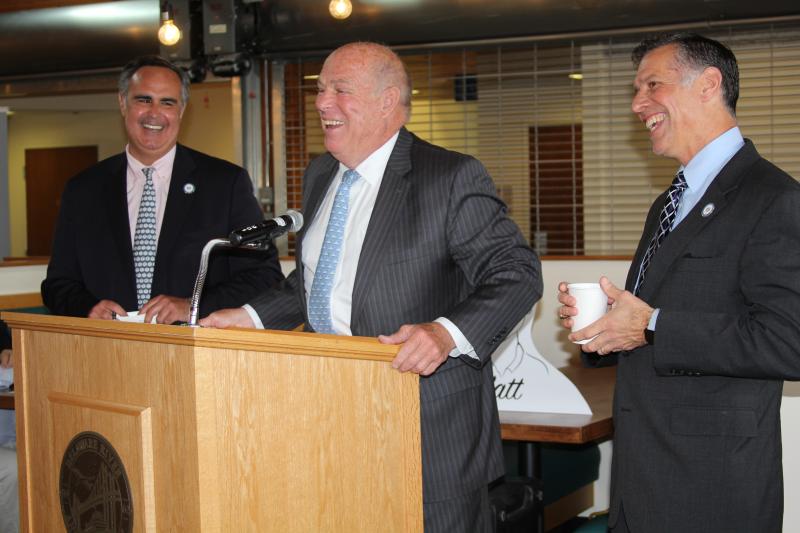One, maybe two, new legislative seats expected downstate
The new census numbers for Delaware are yet to be finalized, but a top legislator says Sussex County could end up with one or two new representative seats when voter numbers are finalized.
“There are some districts upstate that have 11,000 voters, so don't be surprised when we close down a district upstate and move it down south, because that's the only way we can fix this,” said Speaker of the House Rep. Pete Schwartzkopf, D-Rehoboth Beach, during a Lewes Chamber of Commerce membership breakfast held April 29.
Schwartzkopf was joined by Rep. Steve Smyk, R-Milton, and Sen. Ernie Lopez, R-Lewes – a trio commonly referred to as the Three Amigos. “It could end up being four amigos,” Lopez quipped.
Schwartzkopf said definitely one new seat in the House of Representatives will be allocated to the area, possibly two.
“It's going to be very difficult, and there are going to be a lot of people upset,” he said. “I'm already trying to figure out where that thing will go. I don't know how we're going to do it.”
Splitting the Long Neck area to create a district that goes left to right is one option, but nothing is concrete, he said.
Schwartzkopf said a final count for each of the state's 41 representative districts is expected by September, and the General Assembly must pass a new district map by Nov. 8.
“The challenge we have right now is that we have to have redistricting done and passed by both House and Senate by November [8],” he said. “Delaware Constitution says you have to live in your district for a year before you're eligible to run for office.”
According to voter registration counts, Schwartzkopf said, the largest representative district in the state is the 39th District held by Rep. Ron Gray, R-Selbyville, followed by Rep. Steve Smyk, R-Milton and his 20th Representative District, and then Schwartzkopf's 14th District.
There are 28,000 registered voters in Gray's district, about 27,000 in Smyk's, and 25,000 in Schwartzkopf's, he said.
Based on the population of Delaware, Schwartzkopf said, when officials divide out the numbers, he expects the number of voters per district to be about 24,000.
“We're all three above the maximum we're allowed to have. We have to lose 2,000 to 3,000 voters in each of our districts,” he said.
No matter what happens, Gray said he hopes he gets re-elected to his district that now covers coastal communities, running west into the county's farmland zones. “I try to represent everyone in my district,” he said.
Smyk said if Sussex County gets another seat, it could help the area pool more resources to handle ongoing growth. “I think it's important that Sussex County celebrates this,” he said. “We don't have a big voice now.”
Smyk estimated that he could lose about 10,000 voters from a district realignment and still be OK.
“I'm not worried about what will happen. I want to be the person who best fits my district,” he said.
Minimum wage
It won't be long before a bill to raise Delaware's minimum wage to $15/hour hits the House floor for a vote, and Schwartzkopf said he's not looking forward to it.
“I'm in a tremendously hard place when it comes to minimum wage with my caucus,” he said. “I may be in a position where I vote for $15, but it won't be what's written right now. If it's not amended, I probably will not vote for it. If it gets amended, I might.”
Schwartzkopf said there should be no talk of a wage increase while the state is still in a state of emergency, and businesses have been at 50 percent occupancy.
“We're going to add costs to a business that can't make any more money?” he asked. “I'm really in a bad spot.”
Smyk said New Castle County and eastern Sussex County have higher wages than other parts of the state, but those wages should be dictated by where people live, not by the government.
“When it comes to the minimum wage, I don't think we should as a government put a blanket minimum throughout the state. I think it should be relative to where you work,” he said.
On March 18, Lopez was one of seven Republicans who voted against the minimum wage bill when it passed the Senate down party lines by a 14-7 vote. The bill now awaits action in the House Appropriation Committee.
Melissa Steele is a staff writer covering the state Legislature, government and police. Her newspaper career spans more than 30 years and includes working for the Delaware State News, Burlington County Times, The News Journal, Dover Post and Milford Beacon before coming to the Cape Gazette in 2012. Her work has received numerous awards, most notably a Pulitzer Prize-adjudicated investigative piece, and a runner-up for the MDDC James S. Keat Freedom of Information Award.






















































